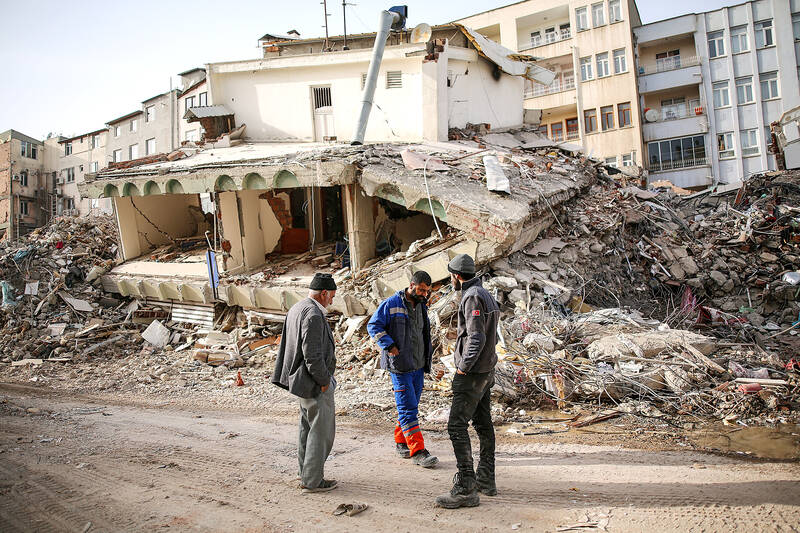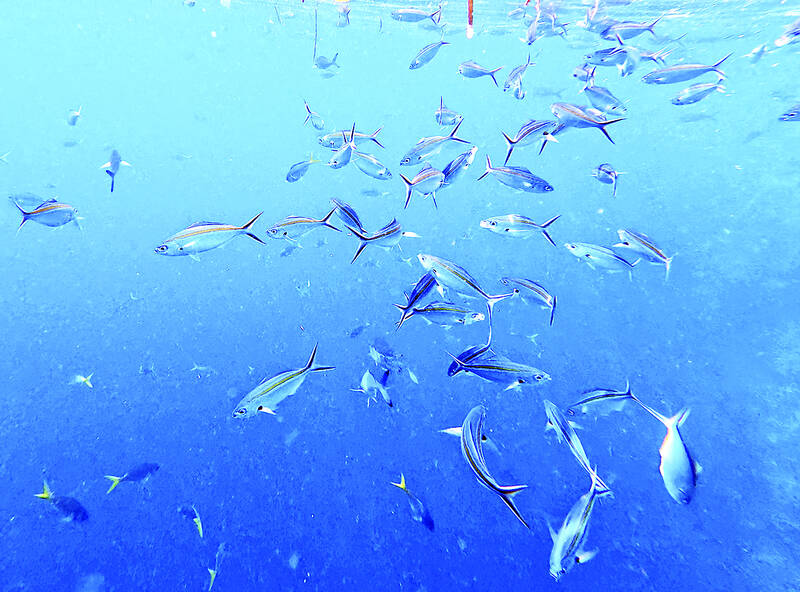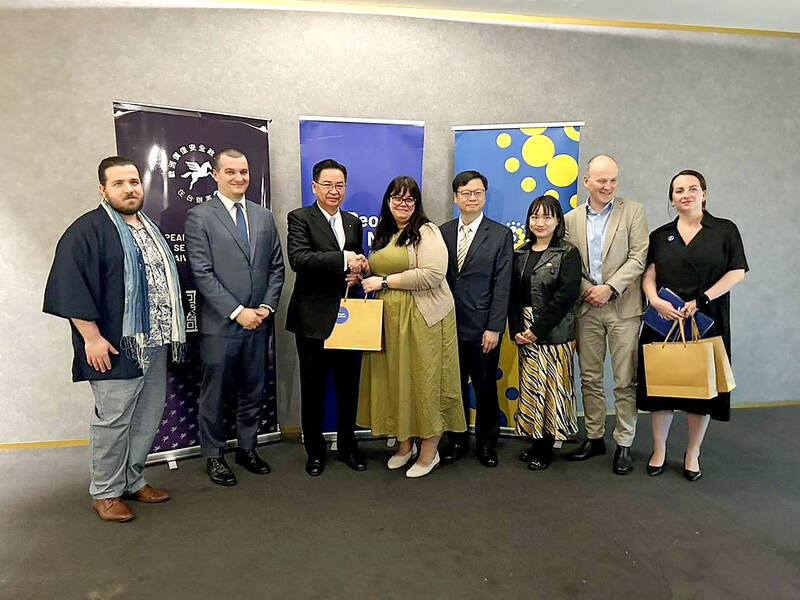That US assistance was a model for Taiwan’s spectacular development success was early recognized by policymakers and analysts.
In a report to the US Congress for the fiscal year 1962, former President John F. Kennedy noted Taiwan’s “rapid economic growth,” was “producing a substantial net gain in living.”
Kennedy had a stake in Taiwan’s achievements and the US’ official development assistance (ODA) in general: In September 1961, his entreaty to make the 1960s a “decade of development,” and an accompanying proposal for dedicated legislation to this end, had been formalized by congressional passage of the Foreign Assistance Act.

Photo: EPA-EFE
Two months later, Kennedy established the United States Agency for International Development (USAID) by executive order to coordinate ODA initiatives. The agency assumed the functions of predecessors such as the International Cooperation Administration (ICA), which — as noted in part one of this article on March 19 — had been active in Taiwan since the early 1950s.
While the intention was to create a body with administrative autonomy from the State Department, the dual origins of the act and the agency tasked with facilitating it portended the current crisis over whether ultimate purview lies with the legislative or executive branch.
With US President Donald Trump’s administration pushing a unitary executive interpretation of government, challenges to its bid to shut down USAID currently occupy the judiciary.

Photo: AP
BROADER SIGNIFICANCE
The threat extends further than is apparent superficially, says Mina Chiang (江玉敏), founder and director of Human Research Consultancy (HRC). A UK-based social enterprise that combats human trafficking and modern slavery, HRC has tackled rights abuses in Taiwan’s fishing industry and cooperated with USAID-funded nongovernmental organizations (NGOs). Chiang cites extant and slated HRC projects involving cooperation with agencies across various fields of expertise that are now jeopardized.
Planned cooperation with UN bodies has also been scuppered, due to the withdrawal of USAID support.

Photo: James Baron
“We were in the very final stage with a bidding process with one UN agency, but we have been informed that it’s on hold, because of the disruption,” Chiang says.
For the International Cooperation and Development Fund (TaiwanICDF), Taiwan’s dedicated ODA agency, the short-term damage looks less disastrous. Speaking in February at an event highlighting cooperation with the Czech-based People in Need (PIN) — one of Central Europe’s largest humanitarian NGOs — TaiwanICDF Deputy Secretary General Peifen Hsieh (謝佩芬) noted that projects with USAID were generally coordinated in stages.
For two ongoing projects on digital healthcare in Fiji and strengthening micro, small, and medium sized enterprises (MSMEs) in Paraguay, the USAID-backed contribution has been completed, Hsieh says.
“For the health projects in Fiji, USAID provided the hardware, and we provided the software, so they have done their part, and that project will be concluded in May,” she says.
In an e-mailed response, TaiwanICDF public relations specialist Elisa Chiang (張郁琪) confirmed that USAID had provided servers and tablets “in mid-2023” and noted that a USAID representative in Fiji had continued to support the project through participation in meetings, technical guidance and promotional efforts.
“As a result, the project has not been affected by the current situation at USAID,” Chiang wrote.
The Paraguay project, said Hsieh, was in “a similar situation,” though the status of cooperation on climate-related disaster resilience under USAID’s Pacific American Fund remained unclear.
Much has been made in international media of opportunities for Beijing that Trump’s ODA backsliding may offer. But aside from providing “proof” of the US’ unreliability as a partner — a common theme in Chinese propaganda — there are wider security implications.
One example is evident in collaboration between the TaiwanICDF and USAID on strengthening the monitoring of illegal, unreported and unregulated fishing (IUU) in Palau. Ostensibly about safeguarding Palau’s exclusive economic zone (EEZ), the project serves other purposes.
“A lot of illegal Chinese vessels operate in that area,” says an ODA professional (quoted under condition of anonymity in part one). “We exchange information about that.”
The broader risks are also picked on by Chiang, who says human trafficking networks are a multifaceted threat.
“America has lost billions to transnational organized criminal groups,” she says. “Stopping funding sends a clear signal for them to expand — and we know they are expanding from satellite images around the borders [in Southeast Asia], where they are building compounds.”
Yet, the structural weaknesses that have undermined USAID may point the way to alternative ODA models complementing Taiwan’s experience. Although USAID started as a hands-on partner to developing countries, it transitioned to a delegatory role, funding, designing, and managing projects implemented by local NGOs.
In contrast, Taiwan has maintained direct assistance through technical and medical missions comprising homegrown experts.
“Rather than delegate, Taiwan dispatches missions to implement projects on the ground,” says the ODA professional.
He believes cooperation between local ODA agencies and Taiwan’s representative offices abroad is another advantage for Taiwan.
“US embassies don’t have much power to control projects,” he says. “That could be one reason Trump took such drastic measures — without state involvement, he does not think [these projects] represent US diplomatic interests.”
TRADE OFFICES
Coordination of ODA through Taiwan’s de facto embassies is backed by other analysts.
“I believe an alternative ODA through Taiwan [trade offices] can be a solution,” says Chien Shiuh-shen (簡旭伸), a professor in geography, development and urban studies at National Taiwan University and an advisor to the Taiwan Alliance in International Development (TaiwanAID) — an umbrella group for Taiwanese NGOs.
He highlights direct assistance on disaster relief from the Taipei Economic and Cultural Mission in Ankara after the devastating earthquake that struck Turkey in February 2023. During the same period, the TaiwanICDF and PIN also cooperated on helping nano and micro-enterprises in Turkish communities recover their losses. These efforts followed the signing of a partnership agreement between Taiwan’s Ankara office and the Turkish Red Crescent to provide humanitarian relief to Afghanistan after the 2022 earthquake there.
While Taiwan’s ODA community prepares for the worst, it is hoping for the best. “I think Taiwan and US are still like-minded countries” said Hsieh at the February event. “Taiwan’s ODA work was greatly inspired by the US, financially and spiritually, so we definitely hope to continue working, not just with USAID, but with other US agencies.”

Three big changes have transformed the landscape of Taiwan’s local patronage factions: Increasing Democratic Progressive Party (DPP) involvement, rising new factions and the Chinese Nationalist Party’s (KMT) significantly weakened control. GREEN FACTIONS It is said that “south of the Zhuoshui River (濁水溪), there is no blue-green divide,” meaning that from Yunlin County south there is no difference between KMT and DPP politicians. This is not always true, but there is more than a grain of truth to it. Traditionally, DPP factions are viewed as national entities, with their primary function to secure plum positions in the party and government. This is not unusual

More than 75 years after the publication of Nineteen Eighty-Four, the Orwellian phrase “Big Brother is watching you” has become so familiar to most of the Taiwanese public that even those who haven’t read the novel recognize it. That phrase has now been given a new look by amateur translator Tsiu Ing-sing (周盈成), who recently completed the first full Taiwanese translation of George Orwell’s dystopian classic. Tsiu — who completed the nearly 160,000-word project in his spare time over four years — said his goal was to “prove it possible” that foreign literature could be rendered in Taiwanese. The translation is part of

The other day, a friend decided to playfully name our individual roles within the group: planner, emotional support, and so on. I was the fault-finder — or, as she put it, “the grumpy teenager” — who points out problems, but doesn’t suggest alternatives. She was only kidding around, but she struck at an insecurity I have: that I’m unacceptably, intolerably negative. My first instinct is to stress-test ideas for potential flaws. This critical tendency serves me well professionally, and feels true to who I am. If I don’t enjoy a film, for example, I don’t swallow my opinion. But I sometimes worry

US President Donald Trump’s bid to take back control of the Panama Canal has put his counterpart Jose Raul Mulino in a difficult position and revived fears in the Central American country that US military bases will return. After Trump vowed to reclaim the interoceanic waterway from Chinese influence, US Defense Secretary Pete Hegseth signed an agreement with the Mulino administration last week for the US to deploy troops in areas adjacent to the canal. For more than two decades, after handing over control of the strategically vital waterway to Panama in 1999 and dismantling the bases that protected it, Washington has